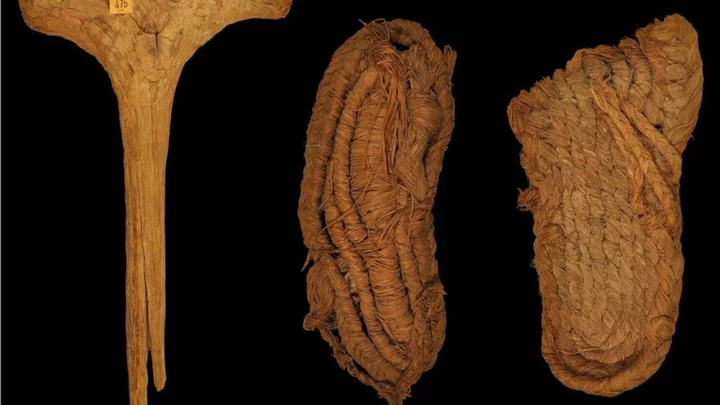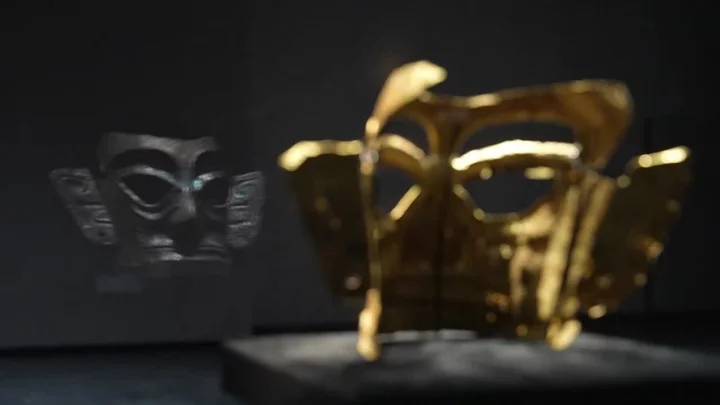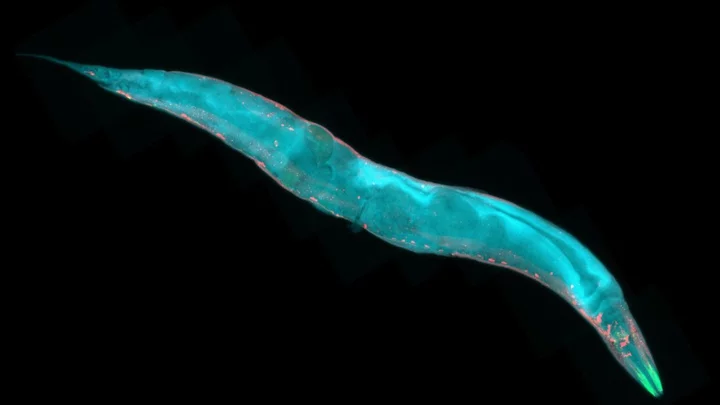
Arm gets Wall Street's 'buy' on royalty plan, cloud expansion
By Aditya Soni and Roshan Abraham (Reuters) -Several Wall Street brokerages started coverage of Arm Holdings with their top ratings
2023-10-09 21:58

CEO of AI company warns his tech has a large chance of ending the world
The boss of one of the biggest artificial intelligence firms in the world has estimated the chance that his technology could end human civilisation is up to 25 per cent. Dario Amodei, chief executive of Anthropic AI, said in an interview that a catastrophic end result of advanced AI technology could come from the tech going wrong itself, or humans misusing it. He said: “My chance that something goes really quite catastrophically wrong on the scale of human civilisation might be somewhere between 10 per cent and 25 per cent. “Put together the risk of something going wrong with the model itself with something going wrong with people or organisations or nation states misusing the model or it inducing conflict among them.” Amodei is a co-founder of Anthropic AI and previously worked for OpenAI, the company which developed ChatGPT. It comes as concerns ramp up across the world about the power of AI, and whether it could eventually lead to catastrophe for humanity. The release of the most recent version of ChatGPT, which illustrated writing skills which, in some capacities such as legal and technical writing, are comparable to that of a human, but at much higher speeds. Amodei added: “That means there is a 75 per cent to 90 per cent chance that this technology is developed and everything goes fine. “In fact if everything goes fine it’ll go not just fine, it’ll go really really great. “If we can avoid the downsides then this stuff about curing cancer, extending human lifespan, solving problems like mental illness… This all sounds utopian but I don’t think it’s outside the scope of what this technology can do.” Amodei did not elaborate on his speculation of how AI could “cure” cancer or “solve” mental illness. A handful of early-stage AI projects have shown promise in early diagnosis of hard-to-detect tumours like some types of lung cancer. But doctors have cautioned against over-optimism of AI’s ability to curer or detect diseases, pointing out that it could also lead to over-diagnosis, potentially making the process even less efficient, rather than more streamlined. Meanwhile, earlier this year, hundreds of AI industry leaders signed an open letter calling for more robust regulations of the technology to lessen the risk that it ultimately leads to the extinction of humanity. The letter, signed by OpenAI founder Sam Altmann and others, said: “Advanced AI could represent a profound change in the history of life on Earth, and should be planned for and managed with commensurate care and resources.” Sign up to our free Indy100 weekly newsletter Have your say in our news democracy. Click the upvote icon at the top of the page to help raise this article through the indy100 rankings.
2023-10-09 19:26

This is the reason why self-service checkouts are fitted with mirrors
With the increasing number of self-service checkout machines popping up in stores for convenience, there is one simple feature that is used to put off potential shoplifters - mirrors. There's a good chance that you've looked at your reflection in the screens fitted to these machines, and the purpose of it is for potential shoplifters to catch themselves in the mirror in the hopes of making them feel guilty. This pang of a guilty conscience is hoped to prevent them from committing any crime (it's not just there for vanity purposes like most of us use it for). Research also backs up the theory that people who see themselves in a mirror are less likely to do something bad. A 1976 study from Letters of Evolutionary Behavioural Science found that when people are around mirrors, they "behave in accordance with social desirability". "Mirrors influence impulsivity, a feature that is closely related to decision-making in both social and non-social situations." When participants in the experiment were looking at mirrors, their "private self-awareness was activated" by them and as a result influenced "decision-making as a non-social cues". Similarly, Psychology Today notes how a mirror allows "people to literally watch over themselves" and this "dramatically boosts our self-awareness". Meanwhile, the issue of self-service checkouts and shoplifting was highlighted in a report by Mashed last year which it appeared to confirm that Walmart's attempt at combatting this problem was a psychological method with the addition of mirrors (though Walmart, alongside other supermarkets, has never confirmed the purpose of their mirrors at their self-service checkout services). Sign up to our free Indy100 weekly newsletter Have your say in our news democracy. Click the upvote icon at the top of the page to help raise this article through the indy100 rankings.
2023-10-09 18:19

Prehistoric footwear dating back 6,200 years discovered in a Spanish cave
A pair of shoes thought to be the oldest ever found in Europe are now estimated to be even older than scientists had previously thought. About 20 pairs of sandals found in southern Spain are at least 6,200 years old, while other woven objects found in the cave date back 9,500 years, according to a new study. The scientists used carbon-dating on 76 objects found in the Cueva de los Murciélagos, Albuñol, near Granada, which were originally discovered by miners in the 19th century. The objects are particularly valuable to science because they represent the first direct evidence of certain hunter-gatherer skills, such as weaving, in southern Europe. They are made of wood, reed and esparto grass. The shoes measured about eight inches in length. The study was published in the journal Science Advances by a team from the Universidad de Alcalá (UAH) and the Universitat Autònoma de Barcelona (UAB). Francisco Martínez Sevilla, a researcher at the Prehistory Department of UAH, said: “These are the earliest and widest-ranging assemblage of prehistoric footwear, both in the Iberian Peninsula and in Europe, unparalleled at other latitudes. “The new dating of the esparto baskets from the Cueva de los Murciélagos of Albuñol opens a window of opportunity to understanding the last hunter-gatherer societies of the early Holocene. “The quality and technological complexity of the basketry makes us question the simplistic assumptions we have about human communities prior to the arrival of agriculture in Southern Europe.” He said the project placed the cave as “a unique site in Europe to study the organic materials of prehistoric populations”. Cueva de los Murciélagos, or “Cave of the Bats,” is located on the coast of Granada, to the south of the Sierra Nevada. The finds are thought to have been so well-preserved because of low humidity levels in the area. Study co-author María Herrero Otal added: “The esparto grass objects from Cueva de los Murciélagos are the oldest and best-preserved set of plant fibre materials in Southern Europe so far known. “The technological diversity and the treatment of the raw material documented demonstrates the ability of prehistoric communities to master this type of craftsmanship, at least since 9,500 years ago, in the Mesolithic period. “Only one type of technique related to hunter-gatherers has been identified, while the typological, technological and treatment range of esparto grass was extended during the Neolithic from 7,200 to 6,200 years before the present.” Sign up to our free Indy100 weekly newsletter Have your say in our news democracy. Click the upvote icon at the top of the page to help raise this article through the indy100 rankings.
2023-10-09 17:49

Archaeologists have just found a rare 18th-century cold bath
Archaeologists have found a rare cold bath below the 18th-century Bath Assembly Rooms. The rooms, completed in 1771, were fashionable places of entertainment, conversation, dancing and gambling and cold baths were seen as good for people's health. The cold bath is in the centre of a suite of three rooms beneath one end of the ballroom. It has dressing rooms on either side. The excavation involved removing a later floor that had been installed over the cold bath and removing tonnes of rubble to reveal steps down into it. Bruce Eaton, of Wessex Archaeology, which oversaw the excavation, told the Guardian: “Although historical records indicated that there was a cold bath buried beneath the Bath Assembly Rooms, we had no idea what preservation of the bath would be like. “The building suffered damage at the hands of the Luftwaffe and the rooms were remodelled in the late 20th century but, after carefully excavating tonnes of concrete and rubble, we saw the original structure emerge in its entirety. “It’s tremendous to be able to piece together this rare archaeological evidence of an 18th-century cold bath with social historical accounts from the time.” Tatjana LeBoff, a project curator at the National Trust, said: “The cold bath at the assembly rooms is highly unusual. It is a rare, if not unique, surviving example, and possibly it was the only one ever built in an assembly room.” The trust was researching records, letters, diaries and other documents to discover more about the cold bath, she said. Sign up to our free Indy100 weekly newsletter Have your say in our news democracy. Click the upvote icon at the top of the page to help raise this article through the indy100 rankings.
2023-10-09 16:46

Activist investor Nelson Peltz boosts Disney stake, seeks board seats - WSJ
Activist investor Nelson Peltz's Trian Fund Management has accumulated a stake worth more than $2.5 billion and is
2023-10-09 11:25

New discovery of rogue planets defies scientific theory and leaves experts baffled
Planet-like objects in the Orion Nebula have been revealed for the first time in images from the James Webb Space Telescope. The Orion Nebula, one of the brightest nebulae in the night sky, has long presented astronomers with an abundance of celestial objects to study. It is identifiable as the sword in the Orion constellation and is located 1,300 light-years from Earth. Astronomers managed to discover unprecedented details by capturing mosaics of the Orion Nebula in short and long wavelengths of light. Whilst searching for low-mass objects, astronomers Samuel G. Pearson - a European Space Agency research fellow at the European Space Research and Technology Centre in the Netherlands - and Mark J. McCaughrean - senior adviser for science and exploration at the European Space Agency - came across something they had never before seen. Their discovery appears to defy some fundamental astronomical theories: pairs of planet-like objects with masses between 0.6 and 13 times the mass of Jupiter. They have been dubbed Jupiter Mass Binary Objects, or JuMBOs. "Although some of them are more massive than the planet Jupiter, they will be roughly the same size and only slightly large," said Pearson. The astronomers found 40 pairs of JuMBOs, and although they exist in pairs, the objects are typically about 200 astronomical units apart, or 200 times the distance between Earth and the sun. This means it can take between 20,000 and 80,000 years for the objects to complete an orbit around each other. McCaughrean and Pearson have written two research papers based on their discoveries in the Orion Nebula. The preliminary findings are available on a preprint site called arXiv whilst the studies have been submitted to academic journals for publication. But many questions about JuMBOs remain. "Scientists have been working on theories and models of star and planet formation for decades, but none of them have ever predicted that we would find pairs of super low mass objects floating alone in space - and we're seeing lots of them," Pearson said. "The main that we learn for this is that there is something fundamentally wrong with either our understanding of planet formation, star formation, or both." Sign up to our free Indy100 weekly newsletter Have your say in our news democracy. Click the upvote icon at the top of the page to help raise this article through the indy100 rankings.
2023-10-08 21:17

Study suggests even basic worms can experience human-like emotions
Everybody hurts sometimes – even the most basic worms in the animal kingdom which have no eyes, spine or brain. That’s what scientists have found out about nematode species Caenorhabditis elegans, which possesses basic emotions such as fear. Researchers zapped the worms to see if they would display negative reactions, and the worms continued to “flee” at high speeds for minutes after. The scientists at Nagoya City University in Japan and Northeastern University in the US said the response shows a brain state which is comparable to fear in humans. "These properties have been recently regarded as essential features of emotion, suggesting that C. elegans response to electric shock may reflect a form of emotion, akin to fear," the researchers wrote. The findings are the most recent in a debate over which animals can experience primitive versions of our own emotions. Crayfish and bumblebees have all shown animals can have lasting positive and negative mental states. C. elegans is one of the most basic worms in the animal kingdom. At about 1mm in length it is also tiny and transparent, with no brain, sight or smell. Nonetheless, worms which sensed an electric current for 45 seconds “ran away” for more than two minutes. During this state, they ignored food which was placed nearby, instead scurrying at high speeds. This suggests that the emotional response could be triggered by different stimuli and that one stimulus could inhibit responses to others. When the shock was just five seconds long, the worms fled for a minute and a half before calming down. And when the researchers repeated the experiments with worms that were not to produce neuropeptides – which are the equivalent to human hormones – the worms stayed in a state of fear for longer. "Because the requirement of neuropeptide signaling [in worms] is reminiscent of neuropeptide regulation of fear in mammals including humans, the fear-like brain state may be regulated by evolutionarily conserved molecular mechanisms," the authors of the study wrote. Sign up to our free Indy100 weekly newsletter Have your say in our news democracy. Click the upvote icon at the top of the page to help raise this article through the indy100 rankings.
2023-10-08 18:28

5 times celebrities have spoken out against AI deepfakes
Deepfakes are becoming an increasing concern online with many celebrities and influencers' faces fronting fake scams – and in more sinister cases, NSFW material. For the blissfully unaware, a deepfake is a digitally altered piece of content, often without concern. They're often used with malicious intent for financial gain or to spread false information. The surge in deepfakes has prompted many high profilers to come forward and speak out including MrBeast and Tom Hanks: Martin Lewis The nation's favourite money-saving expert issued a warning over a "disgraceful" scam that could lead vulnerable people to lose money. Lewis said people are using the technology to "pervert and destroy" his reputation to scam people. An advert, which circulated online earlier this year, appeared to show Lewis endorsing an Elon Musk-backed investment scheme. "Musk’s new project opens up new opportunities for British citizens. No project has ever given such opportunities to residents of the country," the AI version of Lewis says in the footage. The real Lewis later told the BBC "it's pretty frightening." He continued: "These people are trying to pervert and destroy my reputation in order to steal money off vulnerable people, and frankly, it is disgraceful, and people are going to lose money and people’s mental health are going to be affected." MrBeast The popular YouTuber took to X/Twitter to address a deepfake video that went viral online. "Lots of people are getting this deepfake scam ad of me… are social media platforms ready to handle the rise of AI deepfakes? This is a serious problem," he posted to the platform. MrBeast included a clip that has been circulating online, that shows an AI version of him saying he's giving away iPhones. "You’re one of the 10,000 lucky people who will get an iPhone 15 pro for just $2," the deceiving clip said. "I’m MrBeast and I am doing the world’s largest iPhone 15 giveaway." Tom Hanks Hanks was forced to issue a warning over a deepfake advert promoting a dental plan using his presence. In a post to Instagram, Hank shared a screenshot of the ad, with overlaid text reading: "BEWARE!! There’s a video out there promoting some dental plan with an AI version of me. I have nothing to do with it." Nicki Minaj In a much lighter incident, the rapper was featured in ITV's Deep Fake Neighbour Wars. The programme showed an AI version of Minaj and her 'husband,' Tom Holland. Upon arriving home from their honeymoon, they found an intruder in their living room, Mark Zuckerberg. It plays on an internet rumour that joked Minaj and Holland were dating and expecting a baby in 2019. At the time, the actor joked to Esquire: "This actually really stressed me out... and then I realised I've never met Nicki Minaj. So that was a big relief for me because I'm not ready to have kids." She wrote: "HELP!!! What in the AI shapeshifting cloning conspiracy theory is this?!?!! I hope the whole internet get deleted!!!" Streamer Sweet Anita Meanwhile, popular streamer Sweet Anita was horrified to learn she was targeted by deepfake porn without her consent. "It has all the same consequences of revenge porn, and so now I will be living those consequences for a choice I never made," Sweet Anita told ITV. The streamer said the situation has made her "tired" and heightened her security fears. Sign up for our free Indy100 weekly newsletter Have your say in our news democracy. Click the upvote icon at the top of the page to help raise this article through the indy100 rankings.
2023-10-08 17:19

Spain's PLD Space launches private rocket in milestone for Europe
By Graham Keeley and Tim Hepher MADRID (Reuters) -Spanish company PLD Space launched its recoverable Miura-1 rocket early on Saturday
2023-10-08 00:50

Scholar dedicated his career to arguing that Jesus was a hallucinogenic mushroom
Since the 1960s, one scholar has dedicated his career to arguing that Jesus was not a living man, but in fact a mushroom. John Marco Allegro was one of the first scholars permitted to decipher the ancient documents now known as the Dead Sea Scrolls, that were discovered in 1947 in the Judean Desert. They contained the oldest surviving versions of books that would later be incorporated into the biblical canon. Allegro and his colleagues were the first to go about making sense of the documents, as they were obviously discovered untranslated, eventually publishing the texts after hard work and disagreements. Allegro then went on to write two more books on the subject in 1958, The Dead Sea Scrolls and The People of the Dead Sea Scrolls, which remain extremely influential. Then in 1970 and again in 1979, Allegro published two more books. These expanded on his idea that Christianity was a cover for a secret cryptic sex cult generated by people under the influence of Amanita muscaria, more commonly known as Fly agaric. And that Jesus was a metaphor for the fungus and its influences. Using etymology, Allegro argued that early Christianity was created by an Essene cult that recorded their practices through the texts of the New Testament. And that evangelists misunderstood the text's true meaning when they transcribed it. There was never a man called Jesus, only a cult that used mushrooms to have hallucinations. He also argued that the God of the Old Testament was "a mighty penis in the heavens who in a thunderous climax of the storm ejaculated semen upon the furrows of Mother Earth." Allegro's views were not well received, with some believing he created the argument as revenge against Christian critics who dismissed his earlier translations of the Dead Sea Scrolls, whilst some believed he just ran away with the wrong idea. Sign up to our free Indy100 weekly newsletter Have your say in our news democracy. Click the upvote icon at the top of the page to help raise this article through the indy100 rankings.
2023-10-08 00:21

India tells X, YouTube, Telegram to remove any child sexual abuse material
MUMBAI (Reuters) -India has sent notices to social media platforms X, formerly known as Twitter, YouTube and Telegram asking them
2023-10-07 18:58
